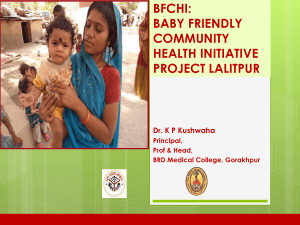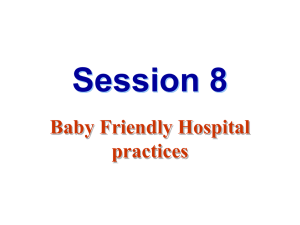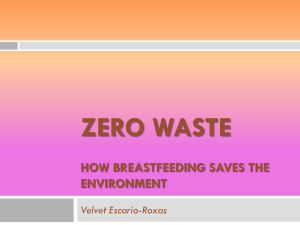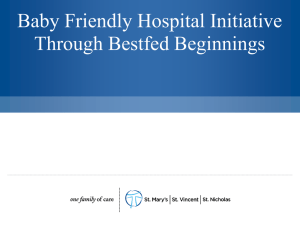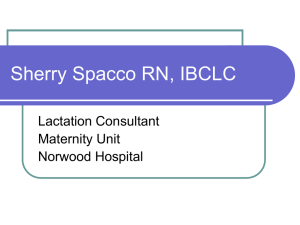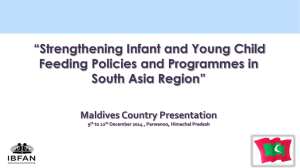Presentation on BREASTFEEDING SUPPORT: Close to mothers
advertisement
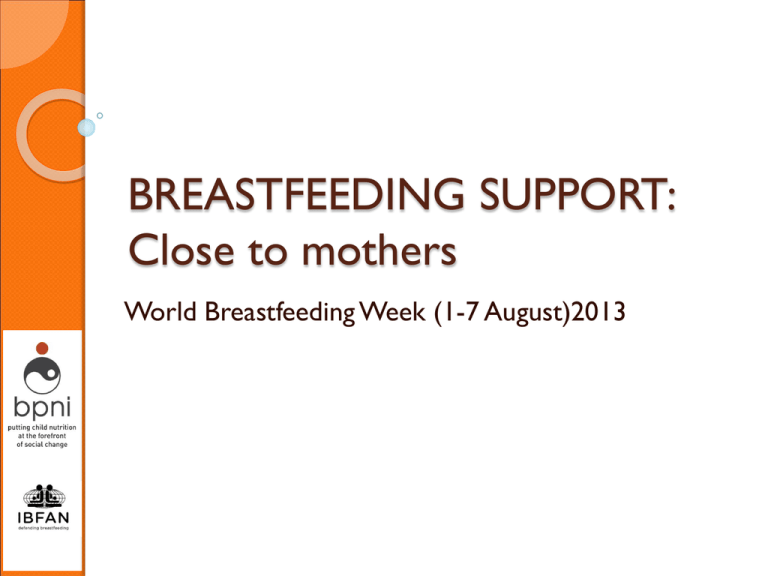
BREASTFEEDING SUPPORT: Close to mothers World Breastfeeding Week (1-7 August)2013 WBW Theme The World Breastfeeding Week (WBW) Theme of 2013 highlights : How to bring breastfeeding support close to mothers and thereby increase breastfeeding rates. The action folder will focus on peer counseling through the community systems under health and nutrition care while taking stock of all kinds of support that is required to achieve the goal of having … “BREASTFEEDING SUPOORT CLOSE TO MOTHERS” Introduction The first two years of a child's life provides a critical window of opportunity for appropriate growth, development and child survival. To ensure appropriate growth & development and child survival it's crucial to sustain optimal infant and young child feeding practices (IYCF) of new borns, infants and young children. Optimal practices include initiation of breastfeeding within one hour of birth, exclusive breastfeeding for first 6 months, and continued breastfeeding after six months along with appropriate complementary feeding for two years or beyond. Strategies and actions for integrating and promoting appropriate IYCF practices during the first two years of child's life through Government services are consistently increasing over the past few years, but it's only on papers. The time has come to translate these with practices ! Objectives 1. 2. 3. 4. 5. To draw attention of all concerned to the importance of close support in the community and 'one to one counseling' in helping mothers to establish and maintain optimal feeding practices of the children . To make community and governments aware about the multiple level of support women need to sustain and succeed breastfeeding. To share a best practice model of systematic action taken in District Lalitpur (UP) through creating and sustaining a mother support group network across all villages. To call on people representatives and governments to implement best practices. To foster social mobilization on World Breastfeeding Weeks's theme 2013 . Where it can happen ? The increased coverage and regular contact with the mother and community provides great opportunity to stay CLOSE to mothers and caregivers for increasing breastfeeding rates. Medical officers, Staff Nurses, LHV's and ANMs posted at the delivery points are responsible for communication and counseling of women at the health facility. Beyond the health facility at the community level. ASHAs and AWWs provide support during home visits. Village Health and Nutrition Day (VHND) and pre and post natal sessions at Aganwadi Centers. Skilled one to one counseling during home visits is the best way to reach out to mothers and caregivers in the community Who will facilitate peer counseling? Medical officers Staff Nurses LHV's, ANMs, ASHAs, AWWs, Mother support groups Spouse, Family Members and People at Work (formal /informal) How close is the support in India ? The World Breastfeeding Trends Initiative (WBT )'s India assessment 2012 on IYCF policy and program indicators showcases dismal rates of infant feeding practices which are not increasing for the last 2 decades ever since we started measuring. This is because India lacks progress in all its policy and programmes that prevents rise of breastfeeding rates. (World Breastfeeding Trends Initiative (WBT i), India Report 2012, NIPCCD, BPNI, 2012) India has … Poor implementation of IMS Act Lack of information to mother Total lack of one to one counselling for mothers on feeding of infant Inadequate health care support Inability of the health care providers to help nursing mothers Constantly upgrading marketing and promotion of infant formula Continued… How close is the support in India ? It is a simple matter to understand; to practice breastfeeding, women and baby need to be in close proximity with … Appropriate personal and equipped support. Support from family, community, workplace, health facility, emergency or legislations are indispensable. Each level is significant in its own sense, without undermining other Support Systems Specific emphasis is required for peer counseling from family, community and health facility members as one of the vital intervention for increasing breastfeeding rates. A case study of peer support “When my daughter (Aahana) was born I had great difficulty in breastfeeding, my breasts were engorged I was in severe pain due to the engorgement added to the caesarean delivery. I did not get much help from health system and was under stress and guilt of not being able to breastfeed my baby. Almost after 3 days of my daughter’s birth, I got a congratulatory call from my friend and when I cried out to her about my situation, she counseled me and told me that I can breastfeed. She guided me as to how I can overcome the engorgement by simple way of hot fomentation and putting the baby on to the breast and let her suckle. She also guided me to BPNI, where I could get the right information and advise. I am thankful to my friend for supporting and helping me through my difficult phase. Now I feel empowered enough to be a peer support.” Dr Shoba Suri, Senior Programme Officer, BPNI The success story of Lalitpur Uttar Pradesh (UP) BRD Medical College, Gorakhpur conceptualized and implemented the 'Baby Friendly Community Health Initiative' (BFCHI) project in Lalitpur district. The project started in November 2006 continued up to December, 2012 and covered all 6 blocks i.e. Birdha, Jakhaura, Talbehat, Madawara, Mehrauni and Baar in a phased manner covering 951 ICDS villages. The project contributed in improving the nutritional status of children 0-2 years through optimal Infant Feeding (IYCF), immunization of children, improved growth monitoring and breastfeeding promotion. The project adopted centre-based and community based strategy. At the cutting edge is a skilled Mother Support Group (MSG) comprising of AWW, ASHA, and traditional birth attendant/an active mother from the village. Continued.. This intervention in total formed 951 MSGs in 951 ICDS villages. EachMSGwas having 3 members who were trained. As a result total 2853 trained MSG members were available in the whole of Lalitpur. With the 'village level counselors' having been close to mothers, Lalitpur has shown tremendous increase in breastfeeding rates. The percentage increase in initiation of breastfeeding within one hour of birth has gone up from 10.6% (2006) to 62 %( 2011). Exclusive breastfeeding for the first six months has gone up from 6.6% (2006) to 60% (2011). Timely and appropriate complementary feeding during 6-8 months has gone up from 53.8% (2006) to 95% (2011). These are much above the average of Uttar Pradesh State. This project is demonstrating real convergence at village level and a heightened motivation of trainers and village level counselors to prevent malnutrition and morbidity associated with faulty infant and young child feeding practices through skilled peer counseling. http://youtu.be/RGzLdjrUJss ( youtube link for Lalitpur ‘s documentary film) Government of India Commitment The by Planning Commission of India also recognizes the need of peer support for Breastfeeding and Infant and Young Child Feeding Practices (IYCF). Therefore the ICDS Restructuring plan focuses on the critical age group (under 3), pregnant and breastfeeding mothers and Child Care and Nutritional Counselling for mothers of children under three years for integrated early child development. It's laid down that the nutrition and health education services would be redefined accordingly to include parent and community education on integrated child development, health and nutrition services. http://planningcommission.gov.in/plans/planrel/12thplan/pdf/vol_3.pdf Continued … IMS Act Infant Milk Substitutes, Feeding Bottles and Infants Foods (Regulation of Production, Supply and Distribution) Act, 1992 provides regulation against the commercial influence of baby food industry on people with a view to protect and promote breastfeeding. This law provides opportunity for the society to keep a check on industry's inappropriate promotional activities and hold them accountable but still violations do exist in the country and to protect and promote breastfeeding we need to implement this law effectively . http://www.bpni.org/docments/IMS-act.pdf Continued… ICDS Mission Document ICDS Mission document by Ministry of Women and Child Development Government of India (2012) Focuses on the under 3s and early child and learning environment by developing and implementing key strategies to promote optimal IYCF Practices through Interpersonal Communication, intense home contacts. Village drives using relevant IEC, would include improving knowledge and skill base of nutrition counselors, supervisors and frontline workers. Institutions/voluntary organizations with expertise on IYCF practices like Breastfeeding Promotion Network of India (BPNI) would be engaged. http://bpni.org/WBW/2013/Broad-Framework-of- Implementation-ICDS-Mission.pdf Continued… Ministry of Health and Family Welfare, Government of India, Nation Rural Health Mission (NRHM)’s guidelines for “Enhancing Optimal Infant and Young Child Feeding Practices” from (2013) Acknowledge community outreach and home based care of mothers through home visits, one to one counseling and group counseinterventions to achieve optimal infant and young child feeding practices. “Enhancing Optimal Infant and Young Child Feeding Practices” ; Nation Rural Health Mission (NRHM) guidelines 2013 ;Ministry of Health and Family Welfare; Government of India .ling as key These guidelines recommend creating community counselors and skill train them with use of Infant and Young Child Feeding Counseling: A Training Course, "4 in 1" Training Course. (An Integrated course in Breastfeeding, Complementary feeding, HIV & Infant Feeding, and Growth monitoring. http://www.unicef.org/india/6._Operational_Guide_Enhancing_optimal_infant_and_young_chil d_feeding_practices_through_the_public_health_system.pdf Action Areas 1. Develop a petition “ Bring support close to mothers” and get 100 or more signatures and submit to political party functionaries or District Magistrate for taking action . 2. Organize a rally/street theartre in your community for building awareness among people about support , mothers need to breastfeed. 3. Conduct a simple assessment “How close is support to mothers” by interviewing 10-20 mothers and write to governments and media. 4. Organize a local meeting in hospital/health centre/project area/wards/OPDs/resource centers and show the “Lalitpur video to all concerned. http://youtu.be/RGzLdjrUJss 5. Involve local schools and colleges and conduct drawing/painting/debate competition over the theme. Reporting WBW 2013 Report your activity during theWBW2013 to BPNI to become eligible for the World Breastfeeding Week Award and for wider dissemination of your work. You may upload it at.. “Babies Need Mom Made Not Man Made’’(Facebook Page ) Search the below Link : https://www.facebook.com/pages/Babies-Need-Mom-Made-Not-ManMade/301758009914509?fref=ts Send it to bpni@bpni.org or post to BPNI office on the following address : BP-33, Pitampura, Delhi 110 034. +91-11-27343608, 42683059. +91-11-27343606. . THANK YOU !
